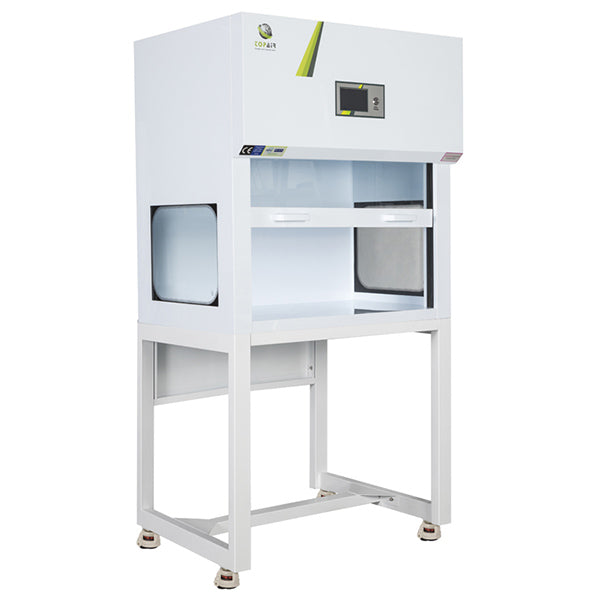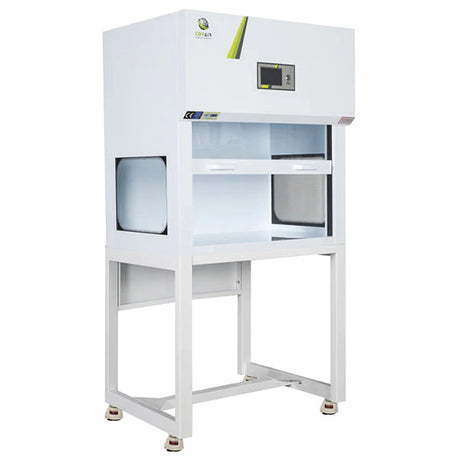- No products in the cart.
In the realm of molecular diagnostics, precision is paramount. As the demand for accurate and reliable results continues to grow, so does the need for advanced laboratory equipment that can meet these exacting standards. PCR cabinets, or Polymerase Chain Reaction cabinets, have emerged as indispensable tools in molecular biology laboratories, playing a pivotal role in ensuring the precision and integrity of diagnostic processes.
What are PCR cabinets?
PCR cabinets are specialized workstations designed to minimize contamination and maintain optimal conditions for PCR reactions. They are essentially enclosed chambers equipped with HEPA-filtered airflow, UV lights, and temperature control systems. The filtered airflow prevents airborne contaminants, such as dust and microorganisms, from entering the cabinet and compromising the reaction. UV lights further decontaminate the interior surfaces by destroying DNA or RNA molecules. Temperature control ensures that the PCR reactions proceed at the optimal temperature for the specific enzymes and primers used.
Why are PCR cabinets important?
PCR is highly sensitive to contamination. Even trace amounts of foreign DNA or RNA can be amplified during the reaction, leading to false positive results. PCR cabinets mitigate this risk by creating a controlled environment that minimizes the chances of contamination. This is particularly important in applications where accurate results are critical, such as diagnosing infectious diseases or detecting genetic mutations.
Key Components of PCR Cabinets
1. HEPA Filtration System
PCR cabinets are equipped with high-efficiency particulate air (HEPA) filters to maintain a clean and sterile environment. These filters effectively capture and eliminate airborne particles, including bacteria, viruses, and dust, ensuring that the working area remains free from contaminants.
2. UV Light Sterilization
To further enhance sterility, many PCR cabinets are fitted with ultraviolet (UV) light sterilization systems. This feature eliminates residual DNA or RNA molecules that may linger on surfaces after use. UV light acts as a powerful tool to decontaminate the cabinet between experiments, minimizing the risk of cross-contamination.
3. Laminar Flow
PCR cabinets often incorporate laminar flow technology, where filtered air moves in a unidirectional flow. This design prevents the introduction of airborne contaminants into the work area, creating a controlled and sterile environment for molecular diagnostic procedures.
Benefits of using PCR cabinets

- Improved accuracy and reliability of PCR results: By minimizing contamination, PCR cabinets help to ensure that the amplified DNA or RNA truly originates from the target sample, leading to more accurate and reliable results.
- Enhanced laboratory safety: The enclosed nature of PCR cabinets protects laboratory personnel from exposure to potentially hazardous biological materials.
- Increased efficiency and productivity: PCR cabinets can be equipped with automated pipetting systems and other time-saving features, which can streamline the workflow and improve laboratory efficiency.
- Reduced risk of errors: The controlled environment of a PCR cabinet can help to minimize human error and ensure consistent results.
Types of PCR cabinets
There are different types of PCR cabinets available, each with its own features and benefits. The most common types include:
- Class II biological safety cabinets: These cabinets provide the highest level of protection for both the user and the environment. They are equipped with negative pressure airflow that prevents aerosols from escaping the cabinet.
- Laminar flow cabinets: These cabinets provide a sterile work environment for non-hazardous materials. They use HEPA-filtered airflow to create a unidirectional flow of air that prevents contamination.
- PCR workstations: These are smaller, benchtop cabinets that are ideal for low- to medium-throughput PCR applications. They typically offer HEPA-filtered airflow and UV decontamination.
Applications in Molecular Diagnostics
1. Disease Detection
PCR cabinets are instrumental in detecting and diagnosing a wide range of diseases. From infectious diseases to genetic disorders, the precision offered by these cabinets ensures accurate identification of pathogens and genetic variations.
2. Forensic Analysis
In forensic laboratories, where minute DNA samples are often analyzed, PCR cabinets play a crucial role in maintaining the integrity of the samples. The controlled environment prevents contamination, allowing forensic scientists to rely on the accuracy of their findings.
3. Genetic Research
PCR cabinets are indispensable in genetic research, enabling scientists to amplify and analyze specific DNA sequences. The sterile conditions provided by the cabinets are essential for ensuring the purity of genetic material under investigation.
Advancements in PCR Cabinet Technology
As technology evolves, PCR cabinets continue to undergo enhancements to meet the evolving needs of molecular diagnostics. Modern cabinets may feature touch-screen controls, real-time monitoring systems, and advanced airflow designs for optimal performance. These advancements not only improve user experience but also contribute to the overall efficiency and reliability of molecular diagnostic processes.
Considerations in Choosing PCR Cabinets
1. Size and Configuration
PCR cabinets come in various sizes and configurations to accommodate the diverse needs of laboratories. Considerations such as available space, sample volume, and workflow requirements play a crucial role in selecting the most suitable cabinet for a specific laboratory setting.
2. Compliance with Standards
PCR cabinets should adhere to industry standards and guidelines to ensure the quality and reliability of results. Compliance with standards such as ISO 9001 and ISO 13485 reflects a commitment to quality and precision in molecular diagnostics.
3. User-Friendly Features
Ease of use is a significant factor in the selection of PCR cabinets. Cabinets with user-friendly features, intuitive controls, and ergonomic designs contribute to a seamless and efficient laboratory workflow.
Conclusion: Precision Redefined in Molecular Diagnostics
PCR cabinets stand as the cornerstone of precision in molecular diagnostics, offering a controlled environment where accuracy is paramount. These cabinets pave the way for breakthroughs in disease detection, genetic research, and forensic analysis by providing a sterile and reliable workspace. As technology advances, so too will the capabilities of PCR cabinets, further solidifying their role in shaping the future of molecular diagnostics. In the pursuit of precision, PCR cabinets prove to be indispensable tools, ensuring that the results generated in laboratories worldwide are not just accurate but also at the forefront of scientific innovation.
For over 40 years, Lab Pro Inc. has been your reliable destination for premium cleanroom lab supplies, including PCR cabinets. Trusted by global industries, we offer exceptional quality in every product. Experience next-day service in California. Contact us online or at 888-452-2776 to explore tailor-made solutions for the laboratory industry. Elevate your experiments with Lab Pro Inc. – your partner in precision and excellence, now featuring biohazard safety cabinets.












































